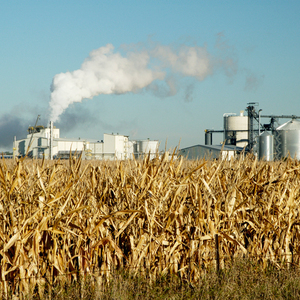ACE urges USDA to reward biofuel producers for carbon reductions

April 29, 2021
BY American Coalition for Ethanol
The American Coalition for Ethanol encouraged the USDA to help establish a protocol for biofuel producers and farmers to easily document the carbon intensity benefits of changes in agricultural practices in comments submitted today regarding USDA’s climate strategy for President Biden’s Executive Order on Tackling the Climate Crisis at Home and Abroad. As USDA contemplates the role it will play to advance climate-smart agriculture, ACE CEO Brian Jennings’ comments urge USDA develop a commonsense framework to verify practices that sequester carbon in the soil so farmers and ethanol producers can reap the rewards in future low carbon fuel standard markets.
ACE’s comments detail the opportunity farmers and biofuel producers hold today to help meet the ambitious climate goals set forth by the Biden administration and the critical role USDA could play to help validate farm-level carbon credits for biofuels. “The U.S. will not achieve the ambitious climate goals unless steps are taken to reward farmers and biofuel producers for their ability to be part of the climate solution,” the comments stated.
The written comments highlight that today’s corn ethanol meets the definition of an advanced biofuel with its ability to reduce greenhouse gas (GHG) emissions by 50 percent compared to gasoline. “In other words, we do not need to wait for so-called next generation crops or biofuels, or electric vehicles (EVs) and an entirely new supply chain to support them, to immediately begin tackling climate change.”
Advertisement
Further, the gold standard tool for determining lifecycle GHG emissions of transportation fuels, the GREET model, will be updated soon to account for further adoption of climate-smart farming practices, which would credit corn ethanol for GHG emissions reductions between 60 and 70 percent compared to gasoline. In fact, ACE commented, ethanol is the only transportation fuel that can reach net-negative carbon intensity through carbon capture and sequestration and continued advancements within ethanol facilities and on-farm practices in how biofuel crops are grown.
“The sooner USDA helps validate the role farm-level practices can have in further reducing corn ethanol’s carbon footprint, the sooner the U.S. can begin making good on ambitions to reduce GHG emissions by 50 percent by 2030 and reaching net-zero emissions by 2050.”
Soil carbon models and the GREET model could be used by regulators such as the California Air Resources Board (CARB) today to assign credits for climate-smart farming practices that help reduce the overall carbon intensity of corn ethanol. However, there is a double-standard because CARB chooses not to rely on trusted models to provide farm-level carbon credits for biofuels, but willingly uses models to assign carbon penalties, such as land use change, to biofuels. ACE’s comments offer recommendations for USDA to ensure farmer access to low carbon fuel markets.
Advertisement
Related Stories
CoBank latest quarterly research report highlights current challenges facing the biobased diesel industry. The report cites policy uncertainty and trade disruptions due to tariff disputes as factors impacting biofuel producers.
The U.S. EIA on April 15 released its Annual Energy Outlook 2025, which includes energy trend projections through 2050. The U.S. DOE, however, is cautioning that the forecasts do not reflect the Trump administration’s energy policy changes.
Iowa Secretary of Agriculture Mike Naig on April 10 announced that the Iowa Renewable Fuels Infrastructure Program board recently approved 114 project applications from Iowa gas stations, totaling more than $2.88 million.
The USDA on April 14 announced the cancellation of its Partnerships for Climate-Smart Commodities program. Select projects that meet certain requirements may continue under a new Advancing Markets for Producers initiative.
The governors of Iowa, Nebraska, South Dakota and Missouri on April 10 sent a letter to U.S. EPA Administrator Lee Zeldin urging the agency to set higher Renewable Fuel Standard renewable volume obligations (RVOs).
Upcoming Events










